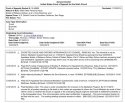Judge Bacall made a ruling on the defendant's motions to compel that were heard 11/20/15. IANAL, but I think it reads like a very fair ruling to both sides-- many questions denied, some allowed to be re-asked. No monetary sanctions for the plaintiffs.
The areas of questions I thought would probably be denied, actually were. A few surprises with the questions Doug should answer-- but that's not a big deal to me, because none of those questions seem at all critical to the foundation of the plaintiff's allegations. (IMO, of course!) I'm sure the defendants feel differently, but that's what the process is all about. I never expected the judge to rule completely "for" or "against" either side on these particular motions to compel.
Here's the ruling. (Thank you to *Lash* for posting.)
http://www.sandiego.courts.ca.gov/v...-00075418&SelDates=11/20/2015&EventId=1601102
Anyway, I have a couple nuts and bolts questions, if you're willing.
First, do the questions granted to be re-asked have to be in a face to face deposition format, or could they be written questions and answers exchanged?
Can they use technology such as skype, or videoconferencing?
If asked in a deposition format, are follow up questions allowed? If so, to what extent are they "typically" allowed before they have to go back to the court to get permission for an additional extended deposition session?
Or do any additional questions have to be approved by the court? The reason I ask is that it could be possible to use a second deposition to foray into a whole lot of unrelated or non-permitted areas of questioning just for the opportunity of a "fuller" second deposition. A lot of those questions permitted to be re-asked are fairly concrete "yes/ no" kind of answers. It doesn't seem realistic that they could go to all the expense, time, and trouble to do a deposition, haul everybody in to a mutually agreed place, hire a court reporter, etc-- just to ask a few "yes/no" questions, then pack up and go home. Or maybe that's just the way it all works? (Which could be a way to run out the $$ and patience of one side or another, or create delays in the case moving along, etc. Either side could do that kind of manuvering.)
Can the defendant decide to
NOT re-ask the questions if they want? Does the court ruling compel them to re-ask the questions they are allowed to ask?
The last page gives the defendant and her attorneys 2 days to submit their plans to the court.
If that elapses, and there is no action by the defendant, do they lose the opportunity to go back and re-ask those particular questions? Why the 2 days qualifier? Is that typical?
Thanks very much for your time! And willingness to explain!

